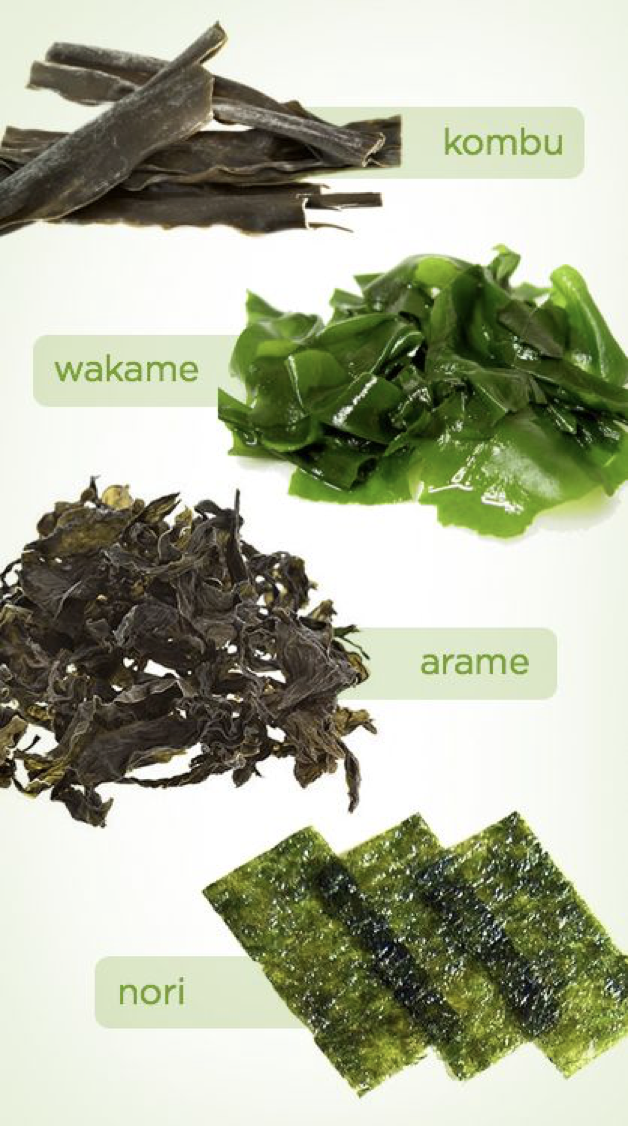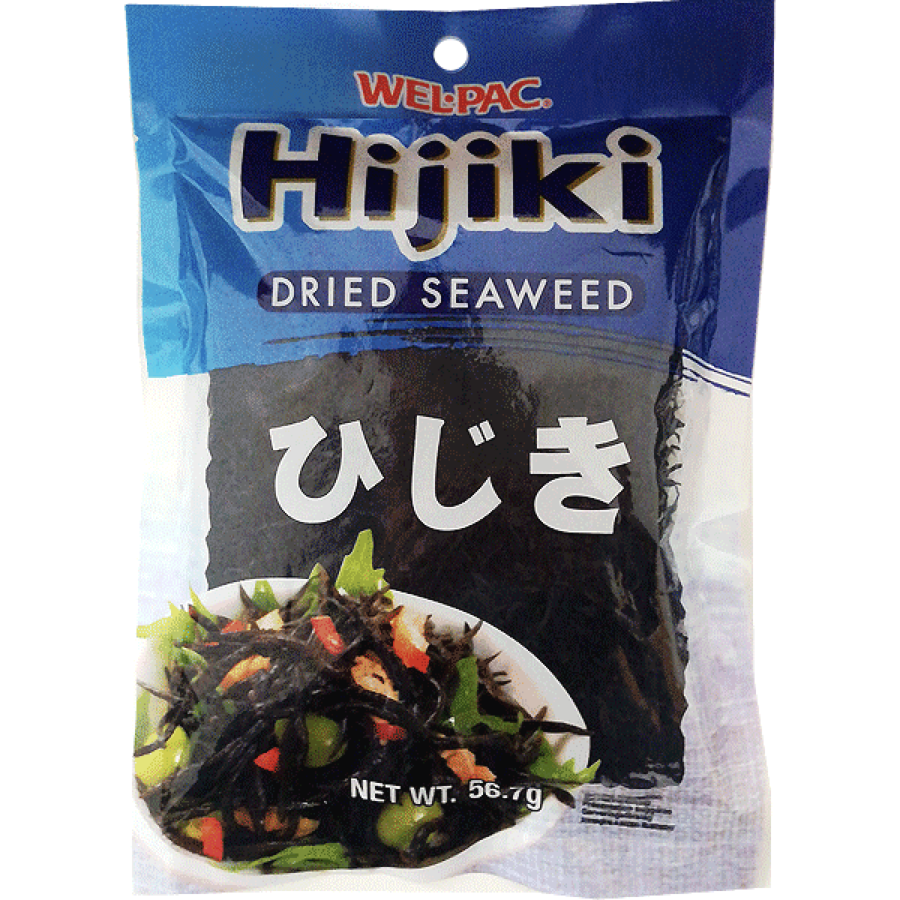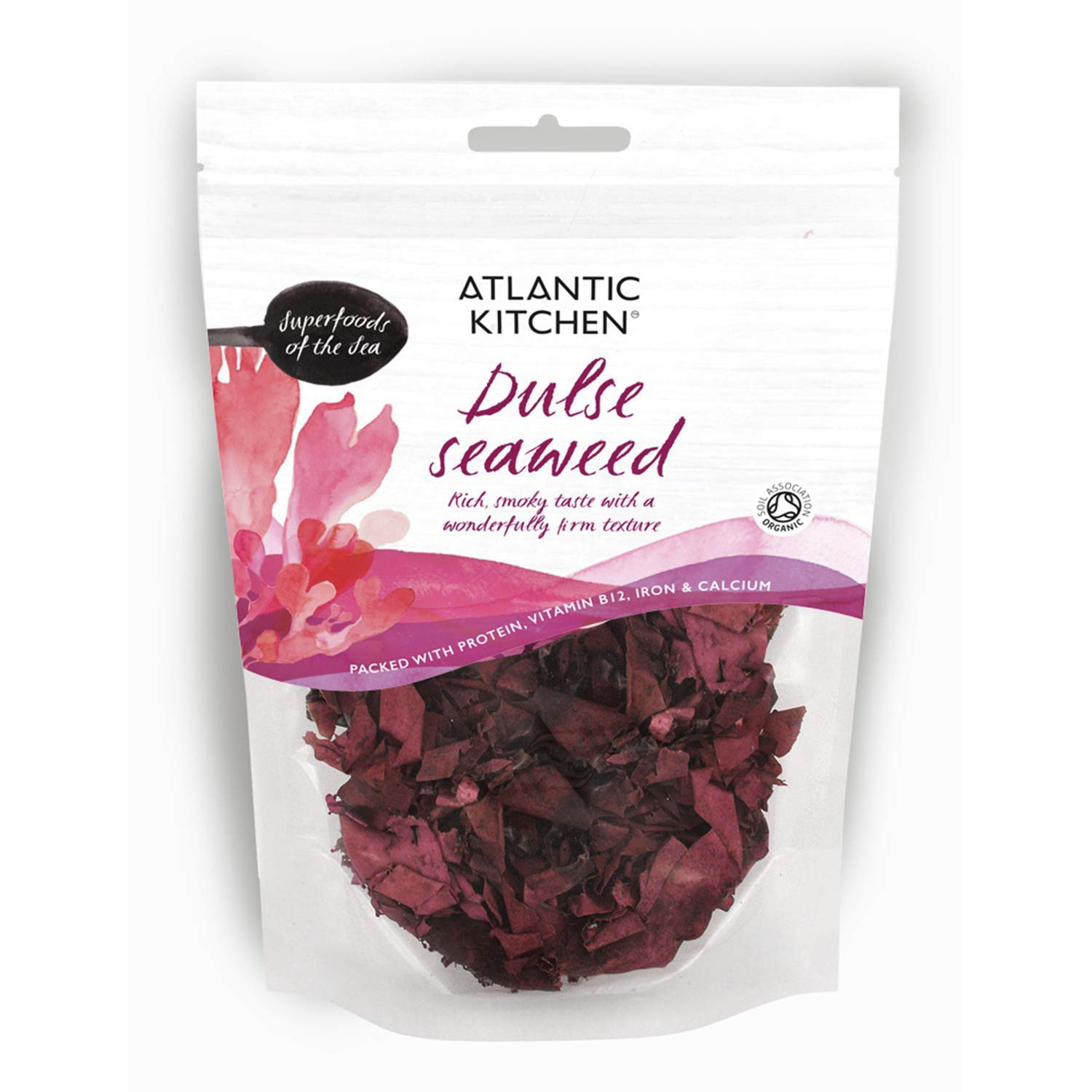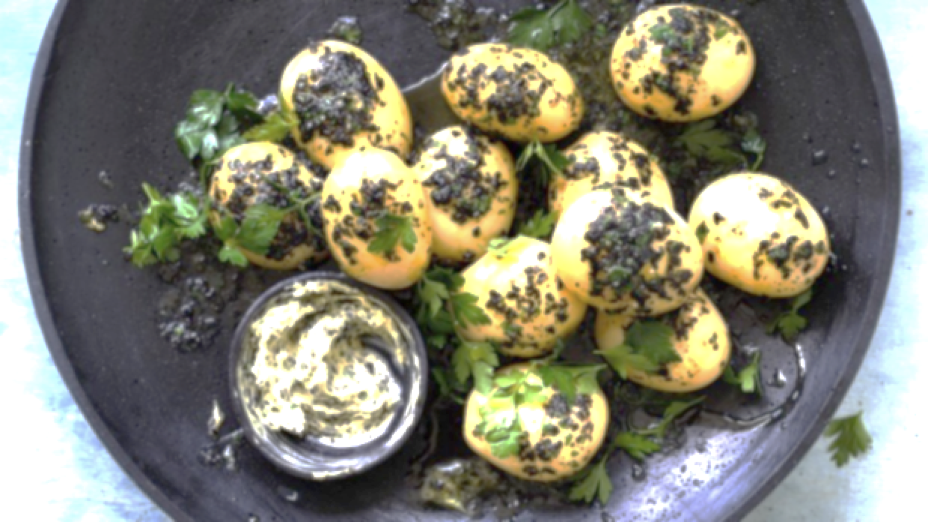Here’s to Eating More SEA Vegetables!
A large number of whole food, plant-based nutritionists and medical doctors are encouraging us more and more to include sea vegetables in our diet. They are talking about varieties of edible seaweed, such as wakame, arame, dulse, hijiki, kombu, kelp and nori, for starters. There are some good reasons for this:

Research shows sea vegetables can transform health. If you’re not familiar with this group of vegetables, let’s look at them one-by-one.
WAKAME is a high-protein, high calcium seaweed, with carotenes, iron and vitamin C. Widely used in the Orient for hair growth and luster, and for skin tone.
ARAME, is one of the ocean's richest sources of iodine. Herbalists use arame to help reduce breast and uterine fibroids, adhesions, and through its fat soluble vitamins and phytohormones, to normalize menopausal symptoms. Arame promotes soft, wrinkle-free skin, enhances glossy hair and prevents its loss.
HIJIKI is a mineral-rich, high-fiber seaweed, with 20% protein, vitamin A, carotenes and calcium. Hijiki has the most calcium of any sea green, 1400mg per 100gr. of dry weight.

DULSE, a red sea plant, is rich in iron, protein, and vitamin A. It is a supremely balanced nutrient, with 300 times more iodine and 50 times more iron than wheat. Tests on dulse show activity against the herpes virus. It has purifying and tonic effects on the body, yet its natural, balanced salts nourish as a mineral, without inducing thirst.
KELP contains vitamins A, B, E, D and K, is a main source of vitamin C, and rich in minerals. Kelp proteins are comparable in quality to animal proteins. A brown marine plant, kelp contains sodium alginate (algin), an element that helps remove radioactive particles and heavy metals from the body. Algin, carrageenan and ager are kelp gels that rejuvenate gastrointestinal health and aid digestion.

It works as a blood purifier, relieves arthritis stiffness, and promotes adrenal, pituitary and thyroid health. Kelp's natural iodine can normalize thyroid-related disorders like overweight and lymph system congestion. It is a demulcent (an agent that forms a soothing film over a mucous membrane, relieving minor pain and inflammation of the membrane) that helps eliminate herpes outbreaks. Kelp is rich and a little goes a long way.
NORI is a red sea plant with a sweet, meaty taste when dried. It contains nearly 50% balanced, assimilable protein, higher than any other sea plant. Nori's fiber makes it a perfect sushi wrapper. Nori is rich in all the carotenes, calcium, iodine, iron, and phosphorus.
I’ll close with an easy and tasty recipe for a potato dish that I found on www.yummly.com. It uses kelp, but also works well with nori and dulse. If you try this, please let me know what you think. Meanwhile, here’s to eating more SEA vegetables!

1 1/2 tablespoons extra virgin olive oil (sesame, almond, or avocado work well also)
3 to 4 regular (diced) or whole baby potatoes
12 inches kelp lightly rinsed
1 1/2 tablespoons low-sodium soy sauce
1/2 teaspoon pure raw honey
1/2 cup water
Directions:
Add Recipe to Cook'n
blog comments powered by Disqus
- They’re a super source of absorbable calcium.
- They help with weight loss and cellulite control.
- They help with detoxification.
- They promote beautiful hair and skin.

Research shows sea vegetables can transform health. If you’re not familiar with this group of vegetables, let’s look at them one-by-one.
WAKAME is a high-protein, high calcium seaweed, with carotenes, iron and vitamin C. Widely used in the Orient for hair growth and luster, and for skin tone.
ARAME, is one of the ocean's richest sources of iodine. Herbalists use arame to help reduce breast and uterine fibroids, adhesions, and through its fat soluble vitamins and phytohormones, to normalize menopausal symptoms. Arame promotes soft, wrinkle-free skin, enhances glossy hair and prevents its loss.
HIJIKI is a mineral-rich, high-fiber seaweed, with 20% protein, vitamin A, carotenes and calcium. Hijiki has the most calcium of any sea green, 1400mg per 100gr. of dry weight.

DULSE, a red sea plant, is rich in iron, protein, and vitamin A. It is a supremely balanced nutrient, with 300 times more iodine and 50 times more iron than wheat. Tests on dulse show activity against the herpes virus. It has purifying and tonic effects on the body, yet its natural, balanced salts nourish as a mineral, without inducing thirst.
KELP contains vitamins A, B, E, D and K, is a main source of vitamin C, and rich in minerals. Kelp proteins are comparable in quality to animal proteins. A brown marine plant, kelp contains sodium alginate (algin), an element that helps remove radioactive particles and heavy metals from the body. Algin, carrageenan and ager are kelp gels that rejuvenate gastrointestinal health and aid digestion.

It works as a blood purifier, relieves arthritis stiffness, and promotes adrenal, pituitary and thyroid health. Kelp's natural iodine can normalize thyroid-related disorders like overweight and lymph system congestion. It is a demulcent (an agent that forms a soothing film over a mucous membrane, relieving minor pain and inflammation of the membrane) that helps eliminate herpes outbreaks. Kelp is rich and a little goes a long way.
NORI is a red sea plant with a sweet, meaty taste when dried. It contains nearly 50% balanced, assimilable protein, higher than any other sea plant. Nori's fiber makes it a perfect sushi wrapper. Nori is rich in all the carotenes, calcium, iodine, iron, and phosphorus.
I’ll close with an easy and tasty recipe for a potato dish that I found on www.yummly.com. It uses kelp, but also works well with nori and dulse. If you try this, please let me know what you think. Meanwhile, here’s to eating more SEA vegetables!

Kelp Hot Potatoes
Serving size: 4
Calories per serving: 119
Ingredients:
Calories per serving: 119
1 1/2 tablespoons extra virgin olive oil (sesame, almond, or avocado work well also)
3 to 4 regular (diced) or whole baby potatoes
12 inches kelp lightly rinsed
1 1/2 tablespoons low-sodium soy sauce
1/2 teaspoon pure raw honey
1/2 cup water
Directions:
Combine the soy sauce and honey. Mix well and set aside. Cut potatoes into bite-sized pieces and sauté in oil until golden. Add kelp cut into 1 in. pieces. Add soy/honey mixture and stir thoroughly. Add water, cover and simmer 15-20 minutes.
Recipe formatted with the Cook'n Recipe Software from DVO Enterprises.
Sources:
- www.pinterest.com
- www.nikankitchen.com
- www.amazon.com
- www.goodfood.com.au
 Alice Osborne
Alice Osborne
Weekly Newsletter Contributor since 2006
Email the author! alice@dvo.com
